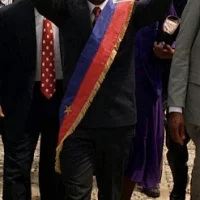It was the wife of the U.S. Ambassador to Greece, John Peurifoy (seen right), who gave him the sobriquet “Pistol Packing Peurifoy” because of his confrontational, straight-shooting style as Chief of Mission in some of the world’s trouble spots in the early 1950s. New York Times foreign affairs columnist Flora Lewis once wrote that he… Read More "Peloponnesian Pilgrimage: An Idyll with the King and Queen of Greece"
Bombing North Vietnam into Accepting Our Concessions: Christmas Bombings, 1972
President Richard Nixon ordered plans for retaliatory bombings of North Vietnam after talks to end the war in Vietnam broke down December 13, 1972. Operation Linebacker II, otherwise known as the “Christmas Bombings,” began December 18 and lasted for two weeks. A total of 741 B-52 sorties were dispatched, dropping 20,000 tons of bombs on… Read More "Bombing North Vietnam into Accepting Our Concessions: Christmas Bombings, 1972"
Play it again, Anne: Casablanca’s First Female Consul General
While America was evolving into a more gender-equal society at the end of the last century, conflicts could arise when female Foreign Service officers went abroad to lead diplomatic missions in countries whose foreign contacts were not used to seeing women in positions of authority. This sometimes led to uncomfortable situations. It was the perseverance, forbearance… Read More "Play it again, Anne: Casablanca’s First Female Consul General"
Haiti has long been plagued by coups d’état and regime changes, leading to long-time political instability and weak governance. In this volatile political field, it was easy for a Haitian leader to assume dictatorial powers, as was the case with President François Duvalier, also known as “Papa Doc.” After becoming the President of Haiti in… Read More "The Overthrow of Haiti’s Aristide"
Lesley Dorman and the Founding of FLO
Lesley Tanburn Dorman devoted her life to her own family and to her wider family – the Foreign Service. Her work to help the families of Foreign Service Officers contributed to the creation of the Family Liaison Office (FLO) at the State Department. Born in England, she met her husband Philip in London, where he… Read More "Lesley Dorman and the Founding of FLO"
Establishing an Escape Network in Post-War Hungary
Throughout most of World War II, Hungary operated in conjunction with the Axis Powers and actively contributed to the Nazi war effort under the leadership of Miklós Horthy. While invading Soviet troops had pushed out the occupying German forces by April 1945, the newly established Russian presence quickly posed a precarious threat to Hungarian stability… Read More "Establishing an Escape Network in Post-War Hungary"
The Siberian Seven: Escaping Religious Persecution in the U.S.S.R.
From its inception, the Soviet Union became the first state in the world to actively attempt to eliminate religion from society. Religion was viewed by Soviet leadership as counter-intuitive to scientific reason and as a threat to the consolidation and exertion of state power. Correspondingly, under Soviet religious policy, tens of thousands of houses of worship… Read More "The Siberian Seven: Escaping Religious Persecution in the U.S.S.R."
“How many people can you fit on a 747?”- Operations Sheba and Solomon
The Ethiopian Aliyah, as it is known in Israel, was the migration during the 1980’s of thousands of Ethiopian Jews [known in Amharic as Falashas; some consider the term pejorative] to Israel. The Israeli Defense Force (IDF) played a major role in the evacuation of the Ethiopian Jews as they came under increasing threat from… Read More "“How many people can you fit on a 747?”- Operations Sheba and Solomon"
Kimberley Process: Commercial Diplomacy to Stem the Flow of Blood Diamonds
During the 1990s, several African countries, namely Angola, Cote d’Ivoire, the Democratic Republic of the Congo, Sierra Leone, and Liberia were plunged into chaos and embroiled in devastating civil wars. Thanks to economic and political insecurity and contentious inter-ethnic relations, rebel groups such as the Patriotic National Front of Liberia under the leadership of Guy… Read More "Kimberley Process: Commercial Diplomacy to Stem the Flow of Blood Diamonds"
Beginning of a Beautiful Friendship: The 1951 Treaty of Peace with Japan
The San Francisco Peace Treaty, signed by 48 nations on September 8, 1951, officially ended Japan’s position as an imperial power, provided compensation to those who had suffered in Japan during the Second World War, and terminated the Allied post-war occupation of Japan. The treaty’s seven chapters and preamble marked the end of hostilities between the signatories… Read More "Beginning of a Beautiful Friendship: The 1951 Treaty of Peace with Japan"

